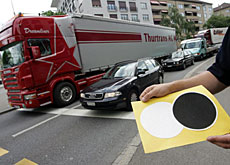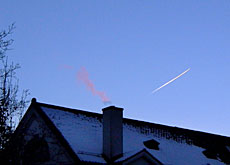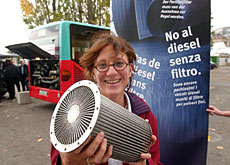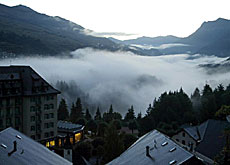Bad air increases pressure on polluters

Poor air quality in many Swiss cities has prompted plans for a raft of new measures to curb emissions of cancer-causing dust particles.
The environment minister, Moritz Leuenberger, on Monday proposed nine new measures aimed at reducing the thousands of deaths caused annually by pollution.
The main aim is to reduce levels of diesel emissions and soot from the burning of wood.
A stable high-pressure weather zone over Switzerland has brought home the extent of the problem in recent days, with dust particles in many urban centres well above levels considered safe.
“The situation is alarming,” said Leuenberger, adding that the level of dust particle emissions in Zurich was double the permitted limit and in Bern one-and-a-half times the limit.
Three of the nine measures are concerned with traffic, which is responsible for 28 per cent of dust particle emissions.
Leuenberger said public transport diesel buses are to be adapted to bring them into line with internationally accepted exhaust standards.
The environment minister also intends to set limits for low-emission vehicles, which will act as a basis for possible cantonal tax increases or driving bans.
Four further measures concern the burning of wood. Smaller wood fires will need to be approved, and the country’s 5,000 large wood burners can expect tighter limits.
In addition Leuenberger wants to submit to the cabinet the introduction of obligatory particle filters for all new diesel vehicles.
Health risk
The environment agency says fine particle air pollution is one of the greatest problems facing the environment and people’s health. It says dust particles cause 3,700 premature deaths in Switzerland a year and annual extra health costs of SFr4.2 billion ($3.4 billion).
According to health officials, particles found in the air, which are natural or manmade and include soot, heavy metals and sulphates, cause respiratory problems and could lead to lung cancer.
Leuenberger said he wanted to implement the measures, which will be under the jurisdiction of the Swiss environment agency, as soon as possible. The approval of the cabinet is required for further measures, including the diesel filter.
“I am convinced the cabinet is aware of its responsibility given the public concern and the clear signals from parliament and the cantons,” he said.
Internationally, he said Switzerland would push for tightened exhaust standards in the European Union and within the framework of the United Nations.
Reaction
Reaction to Leuenberger’s plans was mixed. Andreas Burgener, head of car importers association Auto Schweiz, told the Tages-Anzeiger newspaper that the diesel filter was unnecessary.
“The problem will solve itself,” he said. “Forty-two per cent of all new diesel cars in Switzerland are already equipped with such filters as standard.”
Burgener added that new EU emission directives, which have also been in force in Switzerland since the beginning of the year, will give the filters an additional boost.
The Touring Club of Switzerland said it was against filters for private diesel cars for the same reasons.
The Public Transport Association said it had nothing against fitting public buses with diesel filters, but added that back-up vehicles – often older buses – had to be exempt.
The Swiss Conference of Construction and Environment Directors welcomed stronger emission criteria. Managing director Georg Ganz said cantons would cooperate if the anti-dust measures were targeted at the source, but that guidelines would have to come from the government.
Andreas Keel, from a wood burners’ umbrella organisation, said there had been a voluntary seal of approval for heating systems for 12 years. It was only “old spewing environmental hazards” that were unprepared.
swissinfo with agencies
The Federal Environment Agency estimates that three million people in Switzerland – more than 40 per cent of the population – live in regions which record above average fine particle levels.
The permitted level of fine dust particles in Switzerland and the European Union (EU) is 50 micrograms per cubic metre, a third of the level in the United States.
The federal authorities say dust particles cause 3,700 premature deaths in Switzerland a year and annual extra health costs of SFr4.2 billion ($3.4 billion).
The Swiss environment agency says 21,000 tons of fine dust is emitted in Switzerland every year.
56% comes from the private and public use of mechanical abrasion. The rest comes from diesel motors (17%), wood burning (15%), other burning (10%) and petrol, natural gas and natural oil (2%).
Dust particle emissions regularly exceed the permitted limits in most EU countries.
One EU guideline envisages driving bans in inner cities if limits are exceeded.
In 2005 the EU Commission loosened the limits for fine dust particles – cities have five years to adjust.
In 2003 the congestion charge in London resulted in 18% less traffic and 12% less dust.

In compliance with the JTI standards
More: SWI swissinfo.ch certified by the Journalism Trust Initiative











You can find an overview of ongoing debates with our journalists here . Please join us!
If you want to start a conversation about a topic raised in this article or want to report factual errors, email us at english@swissinfo.ch.